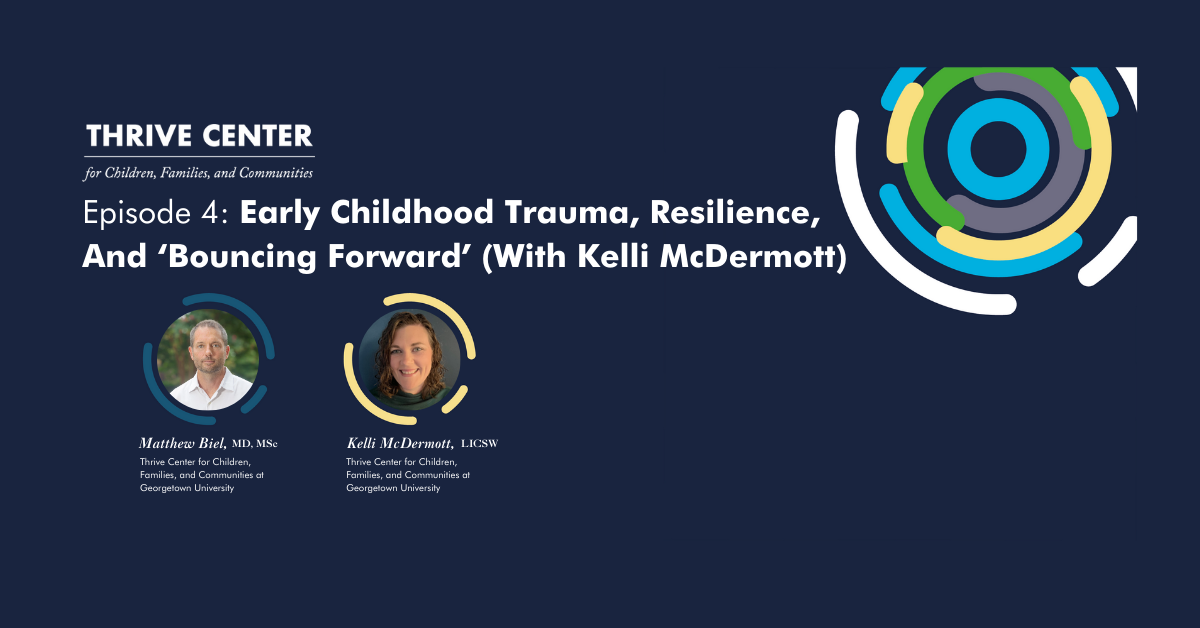Episode 4: Early Childhood Trauma, Resilience, And ‘Bouncing Forward’ (With Kelli McDermott)
Welcome to Episode 4 of Thrive Dispatches, a podcast from Thrive Center for Children, Families, and Communities at Georgetown University.
In this episode, Dr. Biel speaks with Kelli McDermott, an expert in early childhood mental health and trauma. They discuss how nurturing relationships can help young children build resilience, recover from trauma, and thrive. They also discuss the critical role culture plays in shaping resilience and recovery from trauma. Kelli shares her insights on why what’s good for young children is beneficial for all of us, the powerful role adults play in buffering trauma, and how healing can happen through supportive relationships.
For questions, comments, or ideas for future episodes, please email us at: thrivecenter@georgetown.edu
Summary:
In the following excerpt, Matt and Kelli discuss the importance of adult co-regulation—a process in which adults lend their calm and supportive presence to help children manage their emotional and physical states—alongside reflective practice, staff wellness, and organizational support as key factors in creating an environment where young children experiencing stress or trauma can effectively learn and grow.
Matt: What are some of the levers that you have to help move kids towards repair, recovery, resilience?
Kelli: One of the things that we talk quite a bit about in my work, at least, is regulation. And I think that is where we are seeing so much show up for young kids, especially who are trying to make sense of adversity or stress or trauma. And that has led to larger conversations around the capacity of the adults to offer co-regulation.
So opportunities for young children to borrow their energy or their calm, depending on what the situation calls for. And that is hard work and something that I don’t think has gotten a ton of attention, especially in the early education field, until pretty recently. And so we have expanded our conversation that feels directly related to trauma informed care, supporting kids and families who have experienced hard times, and said, we need to talk about reflective practice, right?
This idea of how we understand our own experience when we are being with these young children. How are we managing staff wellness practices beyond the recommendation of self-care? You know, go take a bubble bath or get a massage. How are we doing that in a way that’s actually accessible in real time across the day? And what does that look like and what is the program’s responsibility, if we’re talking about an early education center, to cultivate staff wellness culture at the organizational level? And so when I am thinking about, okay, where can I lean in to move this needle?
Those are the places where I start. What does it feel like as the adult to be in relationship with your co-teacher or your colleague? What does it feel like to be with this child? How do you understand their experience and how does that connect to the way they show up in their relationship with you and other people?
So that’s, I think, where most of our conversations are sitting right now. And then layering on the physical experience of what that might look like for the adults and for the child, especially the child.
- Tagged
- adverse childhood experiences
- child advocacy
- child development
- child wellbeing
- co-regulation
- disability care
- early childhood mental health
- early intervention
- family support
- georgetown university
- innovation
- mental health
- parenting resources
- podcast
- positive childhood experiences
- resilience
- Thrive Center
- thrive dispatches
- trauma recovery
- trauma-informed care
